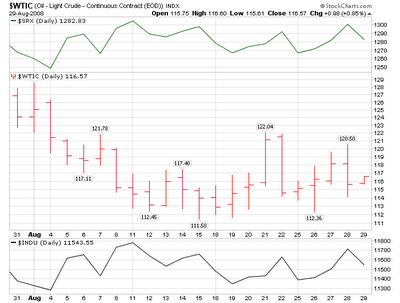For years Bob Brinker has been telling his audience that higher prices for energy, especially oil for heating and gasoline, were not inflationary. (Reference
2006 Monologue "
Oil prices literally going through the roof, and yet to the consternation of many, not listeners to Moneytalk, but to many, including, apparently, the Fed Chairman, they think oil prices are inflationary. That's because they don't understand, they don't understand the taxing effect that these higher gasoline prices have on your pocketbook.")
Brinker correctly says higher energy prices "act like a tax" and slow growth, but he forgets that tax rates are not 100%. This means that oil prices are "less inflationary" than if they didn't act as a tax, but they are still inflationary. Taxing your pay check doesn't mean your pay check turns negative! It just means you get LESS take home pay. Likewise, the "taxing effect" means you get less inflation pressure from the higher prices, not a sign change!

When the inflation component for iBond rates came in at a very low 1.0% last year, Brinker said this "proved he was right" about higher energy prices not causing inflation. I posted a note at the time showing that the price of oil was down 0.6% year-over-year for the period used to set
I-Bond rates so it didn't prove what he said. (see
I Bonds Explained)
Today the Wall Street Journal reported "
Inflation Accelerated Last Month On Higher Prices for Energy"
WASHINGTON -- U.S. consumer prices surged in November on the back of sharply higher energy prices while underlying inflation accelerated at its fastest pace in 10 months, providing fresh evidence that the disinflation trend in place for much of 2007 may be coming to an end.
The data could complicate the Federal Reserve's task of addressing downside economic growth risks at a time when officials remain worried about inflation, and may make them less willing to use their main interest-rate tool to address credit-market strains.
The consumer price index jumped 0.8% in November, the Labor Department said Friday, up sharply ...
To read the rest of the article: 75% off the Wall Street Journal + 8 Weeks FREE!
Lately Bob Brinker has tried to distance himself from his incorrect statement that higher priced oil is not inflationary by saying it doesn't cause core inflation to go up. Well, core inflation is CPI inflation with the more volatile food and energy prices removed. So, of course higher priced energy won't cause a big change in core inflation when you remove energy prices from the calculation!
MarketWatch reported this AM:
U.S. Nov CPI up 0.8%, core rate up 0.3, higher than forecast
Last update: 8:30 a.m. EST Dec. 14, 2007
WASHINGTON (MarketWatch) - The underlying rate of U.S. inflation accelerated in November, the Labor Department said Friday. The consumer price index increased 0.8%, driven by a 5.7% gain in energy prices, the fastest increase in energy prices since March. This is the biggest gain in consumer prices in more than two years. Food prices rose 0.3%, and apparel, airline and drug prices also spiked. The core CPI, which excludes food and energy costs, was up 0.3% in November, the biggest gain since January.
November core inflation at 0.3% times 12 months comes in at 3.6% a year, certainly not "low core inflation" by anyone's definition.
FOMC chairman Ben Bernanke says "price shocks" from higher prices for energy or other commodities like food can cause core inflation to go up if "consumer expectations for inflation" expect more inflation in the future. In practical terms, this mean core inflation will go up if you start telling your boss you need a bigger raise to pay the heating bills and gasoline bills to commute to work just to break-even. As today's inflation data shows, this is starting to happen.
The price of gold is considered the ultimate "inflation hedge" and it is soaring.

This is a very interesting chart from
Chart of the Day
"
Today's chart presents the Dow divided by the price of one ounce of gold. This results in what is referred to as the Dow / gold ratio or the cost of the Dow in ounces of gold. For example, it currently takes 16.7 ounces of gold to “buy the Dow.” This is considerably less that the 44.8 ounces back in the year 1999. When priced in gold, the 21st century US stock market has been in one big bear market." I can't wait to hear how Bob Brinker spins the inflation data this weekend. Even if he doesn't admit he was wrong and the Fed was correct to be worried about inflation, it should prove to be an entertaining show.





























